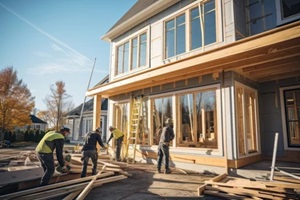 Tennessee is home to natural beauty and bustling cities rich in culture and activities. As a result, it’s no surprise that it’s one of the most popular places in the US to live, and new residential construction is booming in the area. Tennessee sits just outside the top 10 states in the US for the number of homes constructed each year, and this number has continued to increase from 2020 until today.
Tennessee is home to natural beauty and bustling cities rich in culture and activities. As a result, it’s no surprise that it’s one of the most popular places in the US to live, and new residential construction is booming in the area. Tennessee sits just outside the top 10 states in the US for the number of homes constructed each year, and this number has continued to increase from 2020 until today.
This means contractors will likely have their hands complete with residential projects. However, before a construction team can confidently bid on their next project, they must secure comprehensive residential construction insurance.
From state mandates to beneficial additions, here is an overview of insurance requirements to help contractors navigate Tennessee’s residential construction insurance guidelines.
Is Residential Construction Insurance Mandatory in Tennessee?
The state government of Tennessee requires that all residential construction teams carry insurance. Both workers’ compensation coverage and general liability insurance are mandatory for jobs undertaken in Tennessee.
Workers’ compensation pays for injuries if a member of the construction crew is harmed on the job; this may include medical bills, rehabilitative services (such as physical therapy), or even payments to the family in the event of an accidental worker’s death.
General liability insurance is broad coverage for the construction crew that protects them from liability should someone be injured on the construction site. Additionally, if their construction work causes damage to someone else’s property (such as if workers drop lumber from the new build on someone’s car hood), general liability insurance can pay for the damages.
Why Carry Broad-Spectrum Insurance
Because Tennessee requires general liability and workers’ compensation to be included in a team’s residential construction insurance, contractors will likely find few insurance agencies that do not offer these products.
However, it is essential for construction teams not to stop there. Carrying multiple robust insurance policies that address your team’s unique risks is crucial in this industry. First, a residential construction project involves more risk than just what general liability and workers’ compensation can cover.
What if something happens to the company’s vehicle or tools? What if the construction site experiences damage? These issues and more should be addressed using other insurance policies.
Second, general liability and workers’ compensation are not typically sufficient to win contracts. Construction teams may need to prove they have other types of insurance, such as commercial auto, before qualifying for specific projects or buildings in certain jurisdictions. Thus, it is beneficial to be thorough when setting up insurance coverage.
Most Common Types of Construction Insurance Policies
In addition to general liability and workers’ compensation, Tennessee residential construction teams should invest in the following:
 E&O insurance – Sometimes offered under the name “professional liability,” errors & omissions insurance protects a business against legal consequences if the team makes an honest mistake during work. For instance, if a construction crew installs a new door with a peephole that is too high for local code, E&O insurance can pay for the cost of the team to return and replace the door.
E&O insurance – Sometimes offered under the name “professional liability,” errors & omissions insurance protects a business against legal consequences if the team makes an honest mistake during work. For instance, if a construction crew installs a new door with a peephole that is too high for local code, E&O insurance can pay for the cost of the team to return and replace the door.- Commercial auto insurance – Not all construction teams have company vehicles, but those should carry auto insurance coverage for their cars and trucks. Commercial auto shields a business from financial consequences if their vehicle is damaged in a collision or falls victim to theft, vandalism, and sometimes even fire.
- Builders’ risk insurance – While general liability covers the business, builders’ risk insurance protects explicitly the residential construction site. Insurance can cover the cost of fixing the issues of fire, natural disasters, vandalism, and more damage to the new construction. The policy can also pay out to compensate the future residents of the new home if they must secure other housing to adjust to updated timelines for project completion due to unexpected damage.
- Tools & equipment insurance – Construction teams rely on tools large and small to get the job done. Equipment insurance covers these essential items should they need repair or replacement. Each policy will typically stipulate the value of the tools they will cover, and tools valued over this amount may require a separate policy, such as inland marine or commercial property.
Get the Coverage You Need for Your Next Construction Project with Insurance by Burton & Company
Residential construction is booming in Tennessee. Your team must secure the appropriate insurance coverage before bidding on projects.
The experts at Burton & Company can help you understand the mandates governing the types of insurance you must carry, what would benefit your business, and what might not be necessary. Contact Burton & Company to explore insurance options and confidently secure your projects.

